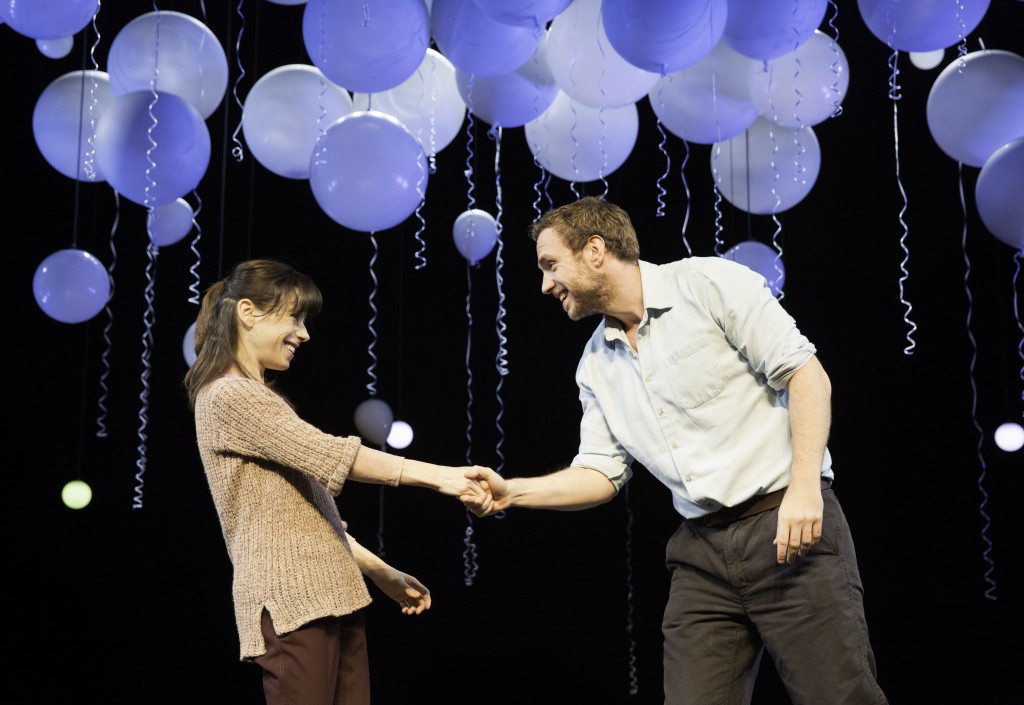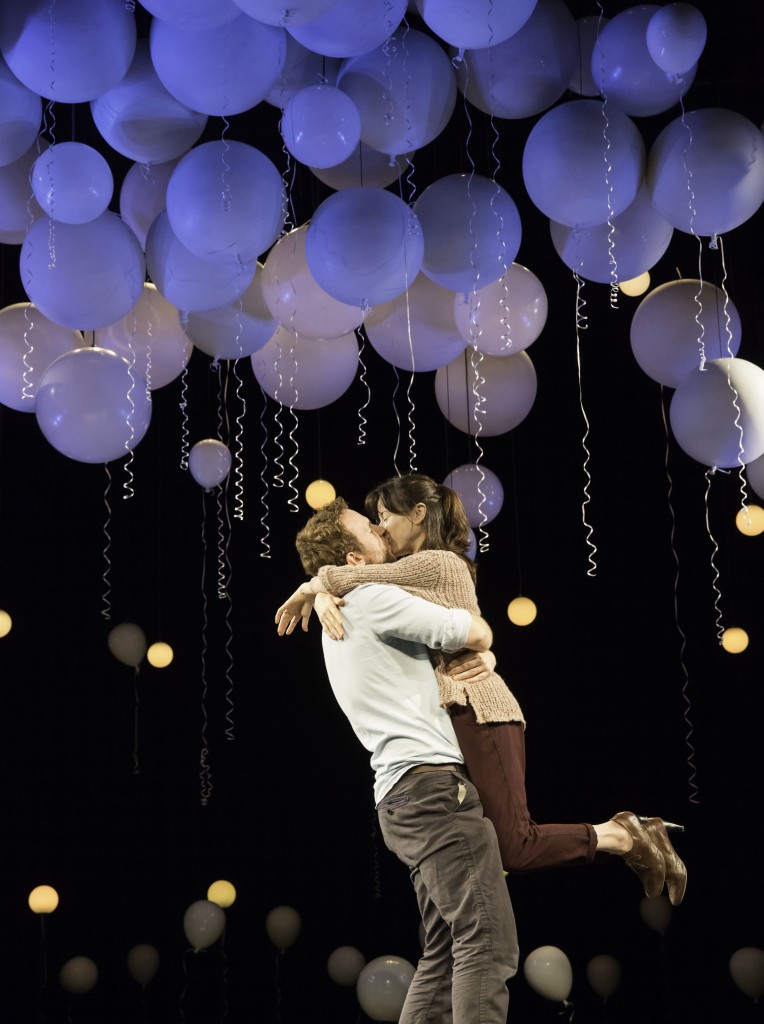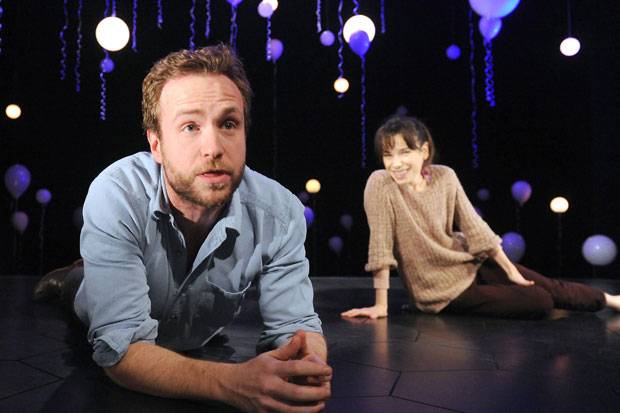Have you ever wondered ‘what if?’ What if I’d had coffee this morning instead of that herbal stuff? What if I’d remembered to top my Oyster card up last night after all? What if I’d got that job last year? What if my parents had called me something different? What if we’d moved to Timbuktu when I was 3? From the mundane to the truly life-changing, the different paths our lives can or could have taken create a spaghetti junction of possible scenarios for the here and now (and future and past). Whether your eyes light up or tilt skywards with boredom at the mention of philosophy, can you really deny ever letting your mind wander down just one of those little trails? Thought not.

Nick Payne has played on the inherent intrigue of this to create Constellations, a canny two-hander which has just transferred from the Royal Court to the Duke of York’s Theatre, picking up the Evening Standard’s Best Play award along the way. Quite rightly; it is different to any other play the West End has to offer. In 70 minutes flat, you are whizzed through the relationship between Marianne and Roland ten times over, witnessing each possible stage of it as all those ‘what ifs’ that gripe at us are played out side by side. It is witty and wise, and very, very slick.
Marianne is a bubbly but quirky quantum physicist who meets Roland, a humble beekeeper, at a barbeque. “Do you know why it’s impossible to lick the end of your elbow?” she asks him. Luckily, we get to see the different responses Roland might have to this valiant attempt at an ice-breaker, from the downright awkward to polite conversation to ending up at her flat. The many worlds interpretation of quantum mechanics tells us that, instead of history playing out as a linear timeline of events where Roland simply makes his excuses and walks off, there is another universe where he makes that polite small-talk, and yet another one where he flirts back with this pretty scientist, and so on. And all of these exist at the same time; as Marianne explains, “in the quantum multiverse, every choice, ever decision you’ve ever made and never made exists in an unimaginably vast ensemble of parallel universes.”

Don’t worry, I’m as scared of scientific stuff (especially physics and quantum jargon) as you are, but no prior knowledge is necessary here. On a plain black stage the two actors converse as normally as can be until, all of a sudden, the lights flash off and on again, leaving us back where we started and ready to experience fate’s other plan. This is how what could be a complicated plot is executed masterfully, escaping fragmentation by maintaining a race pace that doesn’t drop except during those moments with particular gravity, which are given the corresponding air time. Between the jumps, you sometimes end up back at the beginning of the conversation the pair has just had, marking the contention between the different possible outcomes. Sometimes the scene takes you by surprise and places you back or forwards several steps as Payne plays with the sequencing, leaving you wondering where this or that ending fits in. Actually, given what I’ve just said about this ‘ere multiverse, all of those endings fit in – they all exist at once along with those endings that never really happened – but let’s not get ahead of ourselves.
Nothing detracts from the two characters onstage, played stunningly by Sally Hawkins and Rafe Spall. There is no music, a bit of subtle lighting and only some white baubles hanging from up above, which look like stars, or clouds or galaxies surrounding these two pawns in one terrifyingly large game. The gamine Hawkins holds a staggering intensity, managing to intersperse timely wisecracks that lighten the mood without destroying it. Spall is well-suited to the affable Roland, bumbling along much like his bees and standing at times in awe of, at others exasperated by the fiery Marianne. The challenge for Hawkins is, arguably, greater than for her co-star due to the harrowing turns the story – sometimes – takes but the tension and poignancy created would not be possible without two top-class actors responding to one another. Whilst Hawkins occasionally threatens to overshadow Spall, his solid presence and layman-like bewilderment actually make rather a good anchor for her.

Michael Longhurst’s sparse direction allows for a sophisticated exchange between the actors, which is perhaps necessary given the complexity of the themes in hand. Further from the scientific questions of the universe, Nick Payne leads into the philosophical by pondering whether these paths that we take are already decided or not. And if they are, does it really matter what we think we are deciding to do? Moreover, is it possible to trick fate and choose one’s own course? Payne places all of these thoughts straight into your head by binding them together with that good old crowd-pleaser – love – but not once do you feel weighed down or preached at.
This is a cleverly crafted tale that draws you right in over and over again, only to whip you out of it all in an instant. The actors run off the stage as swiftly as they ran on, exhibiting most conceivable emotions along the way to leave you wondering if it was all in fact a dream. Constellations will leave you wide-eyed and exhausted, but absolutely buzzing – it’s very short and very sweet but packs a socking great punch.
Constellations at the Duke of York’s Theatre, St Martin’s Lane, London, WC2N 4BG until Saturday 5th January 2013. For more information and tickets visit the website.



